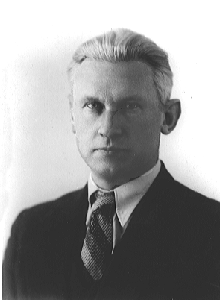 Fadeev, Alexander Alexandrovich. Born, 1901 in
Krimy on Volga, east of Tver. Father was a village teacher, his
mother was a doctor's assistant. Family moved to Vilnius, Ufa,
then to the Far East region of Ussuri in 1908. He went to the
village school in Sarovka, near Iman close to the Manchurian
border. In 1912 the family moved to Chuguevka, further south in
the same region. In autumn of 1912 he entered the Commercial
Academy in Vladivostok. In 1918, during the Japanese occupation of
the region, he joined the Communist Party and became active in the
Bolshevik underground. In the spring of 1919, he left the academy
without taking his final exams and joined the partisans east of
Vladivostok. He saw action at Khabarovsk and Spassk and was
wounded. He then joined the Red Army. In spring 1921, he went to
Moscow as a delegate to the 10th All-Russian Party Congress.
Later, he took part in the suppression of the Kronstadt rebellion
and was again wounded. He was demobilized and entered the Academy
of Mines in Moscow. But in 1924 he left the Academy and went south
to Kradnodar and Rostov-on-Don for Party and journalistic work,
mainly for the Rostov paper Soviet South. He also helped
establish the literary journal Lava. In 1926 he returned to
Moscow and continued his political work for the Writers'
Association. In 1937 he visited Spain during the Civil War. During
the Great Patriotic War (World War II), he wrote reports and
sketches from the front for Pravda and Izvestiya. At
the end of the war he resumed political activities, visiting
Britain in 1947, Iceland and Poland in 1949, and Czechoslovakia and
Austria in 1951. He won two Orders of Lenin, was one of the
leaders of RAPP (Russian Association of Proletarian Writers), and
served on the editorial boards of several literary journals. In
1934 he was elected to the Presidium of the Union of Soviet
Writers, and was General Secretary of the organization from 1946 to
1954. In 1939 he became a member of the Party's Central Committee.
Fadeev, Alexander Alexandrovich. Born, 1901 in
Krimy on Volga, east of Tver. Father was a village teacher, his
mother was a doctor's assistant. Family moved to Vilnius, Ufa,
then to the Far East region of Ussuri in 1908. He went to the
village school in Sarovka, near Iman close to the Manchurian
border. In 1912 the family moved to Chuguevka, further south in
the same region. In autumn of 1912 he entered the Commercial
Academy in Vladivostok. In 1918, during the Japanese occupation of
the region, he joined the Communist Party and became active in the
Bolshevik underground. In the spring of 1919, he left the academy
without taking his final exams and joined the partisans east of
Vladivostok. He saw action at Khabarovsk and Spassk and was
wounded. He then joined the Red Army. In spring 1921, he went to
Moscow as a delegate to the 10th All-Russian Party Congress.
Later, he took part in the suppression of the Kronstadt rebellion
and was again wounded. He was demobilized and entered the Academy
of Mines in Moscow. But in 1924 he left the Academy and went south
to Kradnodar and Rostov-on-Don for Party and journalistic work,
mainly for the Rostov paper Soviet South. He also helped
establish the literary journal Lava. In 1926 he returned to
Moscow and continued his political work for the Writers'
Association. In 1937 he visited Spain during the Civil War. During
the Great Patriotic War (World War II), he wrote reports and
sketches from the front for Pravda and Izvestiya. At
the end of the war he resumed political activities, visiting
Britain in 1947, Iceland and Poland in 1949, and Czechoslovakia and
Austria in 1951. He won two Orders of Lenin, was one of the
leaders of RAPP (Russian Association of Proletarian Writers), and
served on the editorial boards of several literary journals. In
1934 he was elected to the Presidium of the Union of Soviet
Writers, and was General Secretary of the organization from 1946 to
1954. In 1939 he became a member of the Party's Central Committee.
His first published work, Against the Current appeared in
Molodaya Gvardiya in 1923. In 1934 this piece was revised
and renamed The Birth of the Amgunsky Regiment. It is a
story of partisans and Red Army troops in the Far East in 1920.
The Flood (1924) is set in the taiga between the
February and October Revolutions of 1917. The Rout (1927)
is based on the author's own experiences with partisans in 1919
when they were forced to retreat deep into the taiga. He
authored a manifesto piece, The Highway of Proletarian
Literature in 1928. Parts of his second novel, The Last
of the Udege, an attempt at a broad treatment of the Civil War
in the Far East, appeared between 1929 and 1940, but it was never
completed. The tale Earthquake appeared in 1939 and his war
sketches, Leningrad During the Siege came out in 1944. His
third novel, The Young Guard (1945) was based on the heroic
exploits of young Communist underground workers in the Donbass town
of Krasnodon during the Nazi occupation. Another novel, Black
Mettallurgy, intended to show the triumphs of socialist labor,
also never reached completion.
In his last years he suffered from kidney disorder, neuritis,
alcoholism, and depression. During a period of sobriety in May 1956, he committed suicide. His bitter suicide note, clearly revealing his disallusionment with the Party and Stalin, was "arrested" by the KGB at the time of his death and was not released until 34 years later, in the era of perestroika and glasnost. In the note, he wrote:
It is impossible for me to live any further since the art to which I have given my life has been destroyed by the self-confident, ignorant leadership of the Party and can no longer be corrected. The best cadres of literature--in number far more than the tsarist satraps could even dream--have been physically exterminated or have died with the criminal connivance of those in power.
...
Literature, the highest fruit of the new order, has been debased, persecuted, and destroyed. The complacency of the nouveau riche to the great teachings of Lenin--even while they swear allegiance to these teachings--has led to my complete distrust of them. From them we can expect worse than from Stalin--he at least was educated, these new ones are ignoramuses.
My life as a writer loses all meaning. I leave this life with great joy, seeing it as a deliverance from a foul existence, where meanness, lies, and slander rain down on you. My last hope was to tell all this to the people who lead the government, but in the course of three years, despite my requests, they have not been able to receive me.
I ask to be buried next to my mother.
References: Charon's Chronicles--Fadeev
Luker, Nicholas. "From Furmanov to Sholokhov", Ardis 1988.
|


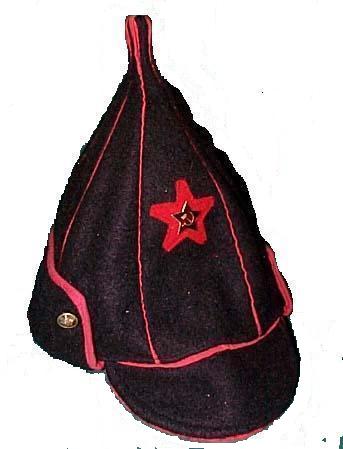 1. MOROZKA. It is July. Commander Osip Abramovich Levinson tells an orderly named Morozka to take a packet to Shaldybin's squadron. Morozka nastily refuses. He always has to go on such missions. Besides, he notes with some vulgarity, he was getting ready to visit his wife at the field hospital where she works. Levinson says if Morozka doesn't want to go, he can turn in his rifle and go wherever he wants. Morozka reluctantly takes the packet, gets on his horse, Mishka, and rides off.
1. MOROZKA. It is July. Commander Osip Abramovich Levinson tells an orderly named Morozka to take a packet to Shaldybin's squadron. Morozka nastily refuses. He always has to go on such missions. Besides, he notes with some vulgarity, he was getting ready to visit his wife at the field hospital where she works. Levinson says if Morozka doesn't want to go, he can turn in his rifle and go wherever he wants. Morozka reluctantly takes the packet, gets on his horse, Mishka, and rides off.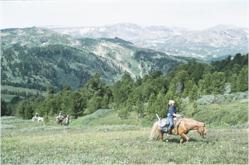
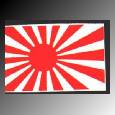
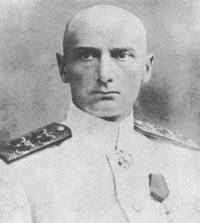
With eyes that were still wet with tears, Levinson gazed at the expanse of sky and earth that promised both food and rest, gazed at the unfamiliar people on the threshing ground whom he would soon have to make just as near and dear to him as the eighteen men riding silently behind him--and he ceased to weep. After all, he had to go on living and doing his duty.

 Fadeev, Alexander Alexandrovich. Born, 1901 in
Krimy on Volga, east of Tver. Father was a village teacher, his
mother was a doctor's assistant. Family moved to Vilnius, Ufa,
then to the Far East region of Ussuri in 1908. He went to the
village school in Sarovka, near Iman close to the Manchurian
border. In 1912 the family moved to Chuguevka, further south in
the same region. In autumn of 1912 he entered the Commercial
Academy in Vladivostok. In 1918, during the Japanese occupation of
the region, he joined the Communist Party and became active in the
Bolshevik underground. In the spring of 1919, he left the academy
without taking his final exams and joined the partisans east of
Vladivostok. He saw action at Khabarovsk and Spassk and was
wounded. He then joined the Red Army. In spring 1921, he went to
Moscow as a delegate to the 10th All-Russian Party Congress.
Later, he took part in the suppression of the Kronstadt rebellion
and was again wounded. He was demobilized and entered the Academy
of Mines in Moscow. But in 1924 he left the Academy and went south
to Kradnodar and Rostov-on-Don for Party and journalistic work,
mainly for the Rostov paper Soviet South. He also helped
establish the literary journal Lava. In 1926 he returned to
Moscow and continued his political work for the Writers'
Association. In 1937 he visited Spain during the Civil War. During
the Great Patriotic War (World War II), he wrote reports and
sketches from the front for Pravda and Izvestiya. At
the end of the war he resumed political activities, visiting
Britain in 1947, Iceland and Poland in 1949, and Czechoslovakia and
Austria in 1951. He won two Orders of Lenin, was one of the
leaders of RAPP (Russian Association of Proletarian Writers), and
served on the editorial boards of several literary journals. In
1934 he was elected to the Presidium of the Union of Soviet
Writers, and was General Secretary of the organization from 1946 to
1954. In 1939 he became a member of the Party's Central Committee.
Fadeev, Alexander Alexandrovich. Born, 1901 in
Krimy on Volga, east of Tver. Father was a village teacher, his
mother was a doctor's assistant. Family moved to Vilnius, Ufa,
then to the Far East region of Ussuri in 1908. He went to the
village school in Sarovka, near Iman close to the Manchurian
border. In 1912 the family moved to Chuguevka, further south in
the same region. In autumn of 1912 he entered the Commercial
Academy in Vladivostok. In 1918, during the Japanese occupation of
the region, he joined the Communist Party and became active in the
Bolshevik underground. In the spring of 1919, he left the academy
without taking his final exams and joined the partisans east of
Vladivostok. He saw action at Khabarovsk and Spassk and was
wounded. He then joined the Red Army. In spring 1921, he went to
Moscow as a delegate to the 10th All-Russian Party Congress.
Later, he took part in the suppression of the Kronstadt rebellion
and was again wounded. He was demobilized and entered the Academy
of Mines in Moscow. But in 1924 he left the Academy and went south
to Kradnodar and Rostov-on-Don for Party and journalistic work,
mainly for the Rostov paper Soviet South. He also helped
establish the literary journal Lava. In 1926 he returned to
Moscow and continued his political work for the Writers'
Association. In 1937 he visited Spain during the Civil War. During
the Great Patriotic War (World War II), he wrote reports and
sketches from the front for Pravda and Izvestiya. At
the end of the war he resumed political activities, visiting
Britain in 1947, Iceland and Poland in 1949, and Czechoslovakia and
Austria in 1951. He won two Orders of Lenin, was one of the
leaders of RAPP (Russian Association of Proletarian Writers), and
served on the editorial boards of several literary journals. In
1934 he was elected to the Presidium of the Union of Soviet
Writers, and was General Secretary of the organization from 1946 to
1954. In 1939 he became a member of the Party's Central Committee.